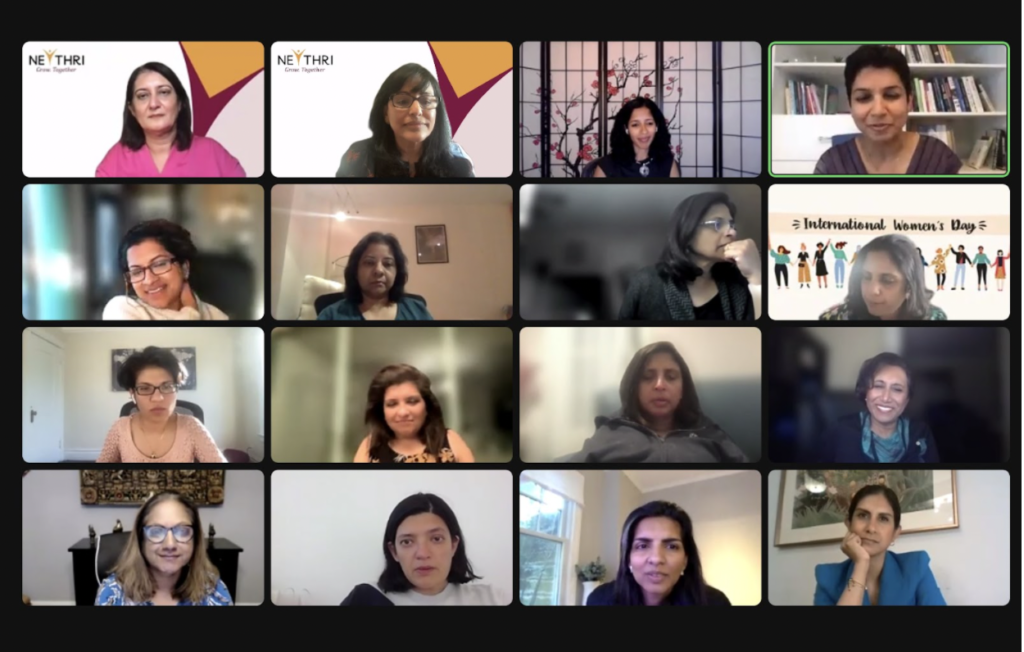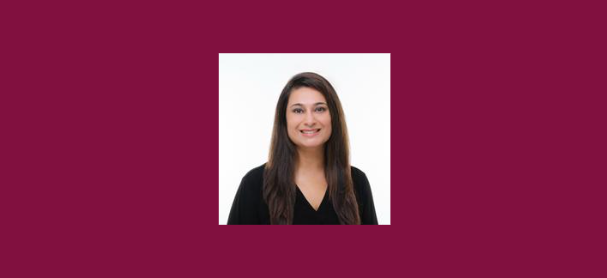
Earlier this month, we celebrated Neythri’s second anniversary and International Women’s Day with an amazing panel of trailblazing female leaders breaking glass ceilings. Neythri’s CEO & Co-Founder, Mythili Sankaran , moderated the panel featuring Krithiga Reddy (President, Athena Technology II), Rooshy Roy (Co-Founder & CEO, Aavrani ), and Aruna Ranganathan (Associate Professor, Management of Organizations, Berkeley Haas).
Each of our panelists brought to the conversation incredible perspectives, often pushing boundaries and conventional stereotypes. Kirthiga’s experiences are those of many ‘firsts’ – she was the first employee at Facebook India, the first female investing partner at Softbank, and is now part of the first all female, all immigrant management team of a SPAC to ring the opening bell at NYSE. Rooshy is a first-generation Indian American who pivoted from investment banking and private equity to build Aavrani, which offers clean, effective skin care products rooted in ancient South Asian beauty rituals. Aruna is an academic who focuses on deconstructing workplace environments to better understand how to attract and retain women – specifically, factory workers, handicraft artisans, and Bollywood musicians in India.
Below are some highlights from the conversation on transformative experiences in their lives, taking risks, being your authentic self, and work-life integration:
When in Doubt, Take a Risk
Rooshy: “Growing up, I didn’t feel like I fit in very much. I couldn’t dance or sing like others in our Bengali community and I was often the only Indian girl or person of color at school. After studying business in undergrad, I started my career in investment banking. After a few years, I transitioned to private equity at Warburg Pincus. Three years in, I noticed I was becoming increasingly unhappy with myself and who I had become, so I went to business school to take a step back and figure out my next role. On my second day of school, I met Justin, my now co-founder at Aavrani. He had prior experience investing in beauty brands and we connected deeply on the idea of bringing the rituals I had grown up with (turmeric masks, coconut hair oil, etc.) to products we could purchase. We ended up transferring our tuition into a joint savings account, took out business school loans, and worked on launching Aavrani. This was a transformative moment when I decided to take a bet on myself, say yes to something different, and align my talent with my passion. So when in doubt, take a risk!”
Aruna: “As I pursued my master’s program at Cornell in the School of Industrial and Labor Relations, I realized that most researchers in my field were doing research on white collar professions or workers in the Americas or Europe. That’s where most of the data in our field lies. It took me a while to discover my own voice and determine that I really wanted to focus my research on low income workers, women entering the workforce for the first time, and handicraft artisans. These are the populations academia has not traditionally focused on. It took some courage for me to share this with my dissertation committee members. I was met with some skepticism initially, but I had the support of great mentors. I was eventually rewarded for taking this risk in the job market, as there was a growing appetite in business schools across the globe to hire academics doing things differently. Even today, I continue to discover populations that I find interesting and may be overlooked in traditional academia.”
Kirthiga: “I have made some unconventional career choices. I started my career as an engineer. When I was Director of Engineering at Silicon Graphics, I realized that I wanted to double down on the business side of things. I wasn’t sure if I should leave the path I was on to pursue my MBA, but my husband told me that it’s better to look back and regret having done something instead of looking back and regretting not having done something. When I graduated from Stanford, I went to a startup as an individual contributor/product manager and took a 40% pay cut from what I was making pre-business school. I remember talking to a recruiter and asking her if this would look bad on my resume. She told me that if I was thinking about this as a short term move, it would probably not look great. But if I thought about this as a long term move, my past experience would help me rise through the ranks again and the experience could be very rewarding. My resume looks linear, but what you don’t see is the jungle gym of growing my career and taking risks. Lean into what calls to you.”
Express Your Authentic Self
Aruna: “One of the studies I conducted in the past focused on women managers at garment factories in India. Garment factories are female dominated in the frontlines, but when you go up the hierarchy, the management is usually all male. I was therefore interested in studying how the few women who do make it up the ranks go about doing so. What I found when I ran a field experiment is that female managers don’t try to fit the mold of male managers. The men have a traditional authoritarian style, often shouting at the workers to produce faster. The women managers realize that if they try to adopt the same methods, it won’t work. So they actually go onto the floor, do the work side by side with their workers, and get their hands dirty. This inspires their subordinates, who end up being more productive! What I take away from this is that it’s better to be your own person instead of subscribing to the male-oriented archetype of a successful leader. You can manage teams differently and embrace your own approach to leadership. This often works a lot better than emulating someone else.”
Rooshy: “Mindset is everything. As an entrepreneur, you fail so much that you often get to the right answer by failing. When I started Aavrani, I came from the corporate world where I was so scared to make a mistake and risk being fired. I had to unlearn that attitude and embrace failure. One example of this is how I felt two years into Aavrani; despite the initial excitement and freedom I felt being an entrepreneur, I started feeling disconnected with our work. It was not authentic to me. This was an awakening where I realized that if I’m going to do this, I have to rewrite the script and make it feel authentic. I needed to explore more, realize who I am, and put that back into the brand. So we worked hard on infusing more of that spirit into the brand. I see this journey now as one where I can pursue my truest, most authentic self and allow the business to be a beneficiary of that exploration.”
Kirthiga: “An early framework that one of my first managers shared with me was to focus on the success of your customers, the organization, and your team. As you focus on these three things, your success is a byproduct. This framework gave me a formula, a moral compass, and a foundation to fight for what I needed to fight for at work. It really became a foundation to use my voice and feel empowered as a leader. Your voice has more power than you think is possible.”
Prioritize Your Well-Being
Kirthiga: “I often reference the superpower called the ‘and.’ There are times when things will look like choices but you can actually bring the two sides together. For example, I had to travel a lot when my second daughter was born but it was important for me to nurse her. So for the first year, I traveled with her, and my teams came together to support me doing this. If a situation that is presented to you feels like an ‘or,’ think about how you can reframe it to be an ‘and.’ It can also manifest in things like trying to do walk and talk meetings where you can knock out some exercise while doing work. Think about ways to tick multiple boxes at once and multiply your time. I’ll also add that one of the best decisions I made for my career and well-being was my choice of life partner. I get tremendous support from my husband Dev.”
Aruna: “I find it very helpful to have a peer support system. Some of my closest friends today are people who went to grad school with me and pursued similar career paths. These are other women who have confronted the same career decisions, similar work-family issues, and so on. Having other people to bounce ideas off of, talk about challenging situations, and problem solve together is everything.”
Rooshy: “As an entrepreneur, you have to be ruthless about your priorities and boundaries. I’ve had to become more self aware and thoughtful about how I spend my time, rethink how I navigate rejections and failures, and take care of myself. I used to think that all the missed meals, lack of sleep, and bad diet were worth it to grow the business. I’ve now turned it around and realized I need to prioritize my well-being to do the best I can for others and the business. I recommend thinking about making small changes: how can you be 5% healthier today? Or how can you do one less unhealthy thing today? I’m someone who is often intimidated by trying to make extreme changes in my lifestyle, which then leads to failure and reconfirms what I’m not good at. So take small steps to keep marching towards your goal.”
***
A huge thank you from all of us at Neythri to our panelists for sharing their experiences with us and inspiring us as trailblazers in each of their fields. Be on the lookout for some exciting projects they are each working on: Aruna is publishing research about the impact of the shift from analog to digital recording technologies on diversity in playback singers in India, Kirthiga is writing a book, working on a startup idea in the NFT/crypto space, and looking for the next company to partner with for her SPAC, and Rooshy is closing out her Series A round and growing Aavrani to address wellness and Ayurvedic education more broadly!
***************
Author Bio:
Sruthi is a technology growth equity investor at ICONIQ Capital, a privately-held investment firm that serves some of the world’s most influential families and organizations. Prior to her current role, Sruthi was an Analyst at Goldman Sachs’ Tech, Media and Telecom Investment Banking group where she worked on mergers and acquisitions, initial public offerings and capital raises in various technology sectors. Sruthi also spent time in marketing at Career Contessa, a career mentorship platform for women, and in business development at Room to Read, a non-profit focused on literacy and gender equality in education. Sruthi serves on the board of Archbishop Mitty High School and is a co-founder of Shakti Collaborative, digital platform that showcases the narratives of South Asian women. Sruthi holds a BA degree in Economics from The University of Chicago.




